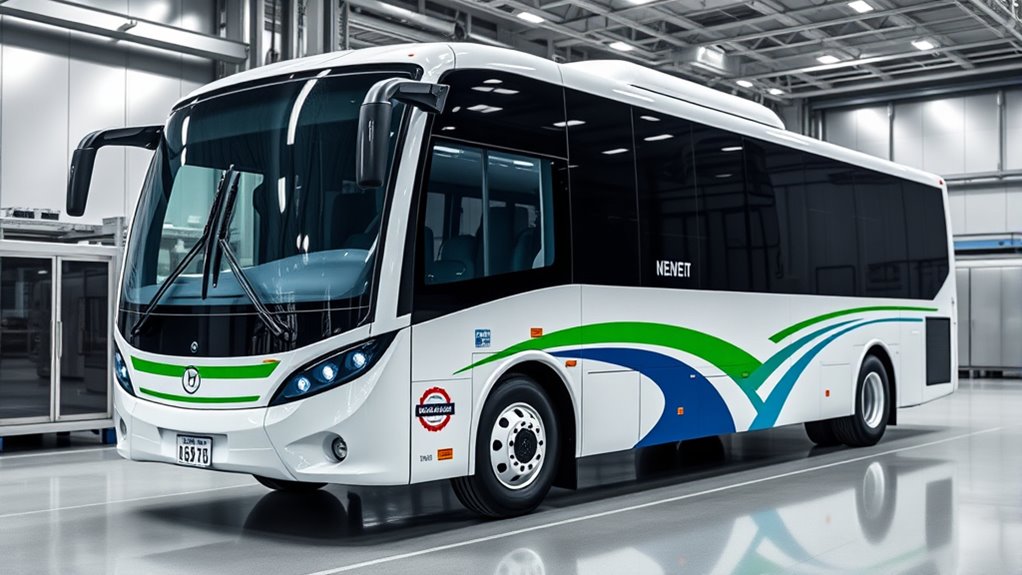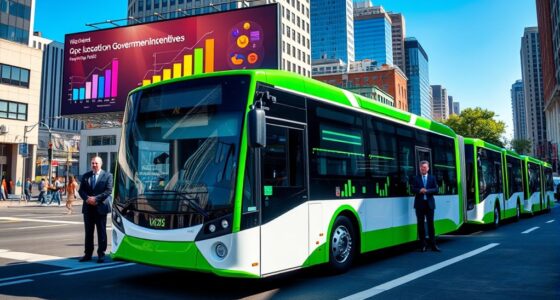Electric bus standards and certifications set essential safety, operational, and technical benchmarks to guarantee reliable, safe, and environmentally friendly transit. They cover everything from high-voltage safety, battery management, and crash protection to industry-wide guidelines like SAE and APTA standards. Certification programs help you maintain quality, safety, and compliance with regulations while enabling access to incentives. Staying up-to-date with these standards ensures your fleet operates efficiently and safely—continue exploring to learn more about these critical industry requirements.
Key Takeaways
- Industry standards like SAE J2910 and SAE J2344 specify requirements for electric vehicle propulsion and safety.
- Certification levels (HV1, HV2, HV3) ensure personnel safety and technical competence in high-voltage systems.
- Regulatory bodies such as the Federal Transit Administration set operational safety and compliance standards for electric buses.
- Battery safety certifications (UL, UN, ISO 26262) guarantee proper design, manufacturing, and fire prevention measures.
- Industry guidelines from APTA and EVSC promote best practices, interoperability, and continuous safety improvements.
Overview of Electric Bus Training Standards
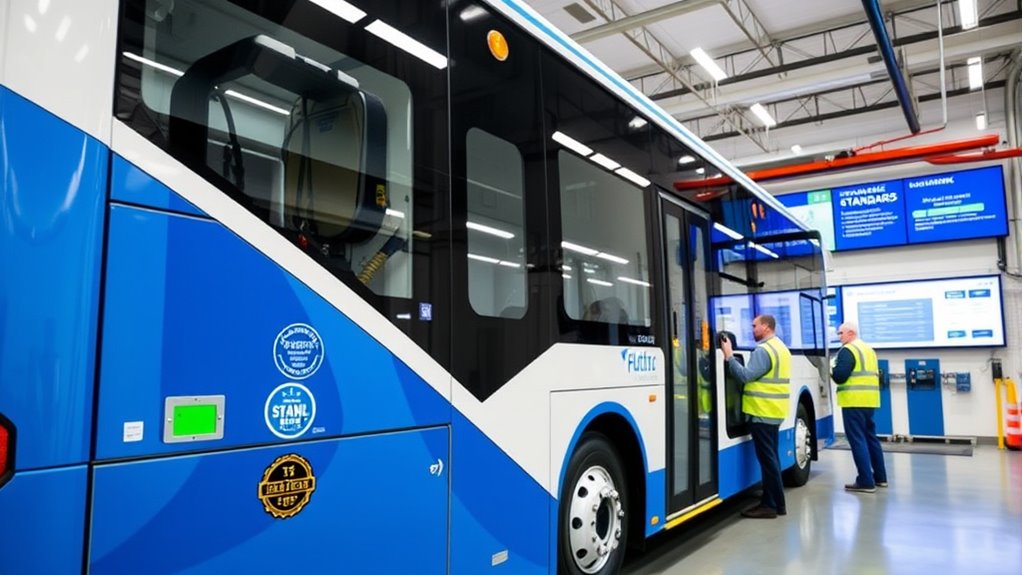
The overview of electric bus training standards highlights the importance of establishing thorough guidelines to guarantee safe and effective operations across the industry. These standards have been peer-reviewed by over 50 experts, including school districts, manufacturers, and subject matter specialists. They incorporate insights from organizations like APTA and EVSC, ensuring alignment with broader electric vehicle standards. The standards emphasize equity and accessibility, guiding adopters to develop inclusive training curricula that meet diverse learning needs. Developed through extensive industry collaboration, they aim to equip personnel—drivers, technicians, fleet managers, and first responders—with the necessary knowledge and skills. A focus on high-quality training materials ensures consistency and effectiveness in educational delivery. Incorporating training evaluation processes helps maintain the standards’ relevance and continuous improvement. Additionally, integrating industry best practices fosters a culture of safety and innovation within electric bus operations. Recognizing the importance of regulatory compliance further supports safe and legal operation of electric buses. The goal is to promote safety, efficiency, and consistency, helping you confidently operate and maintain electric buses while adapting to technological advancements.
Progressive Levels of Certification for Electric Bus Personnel
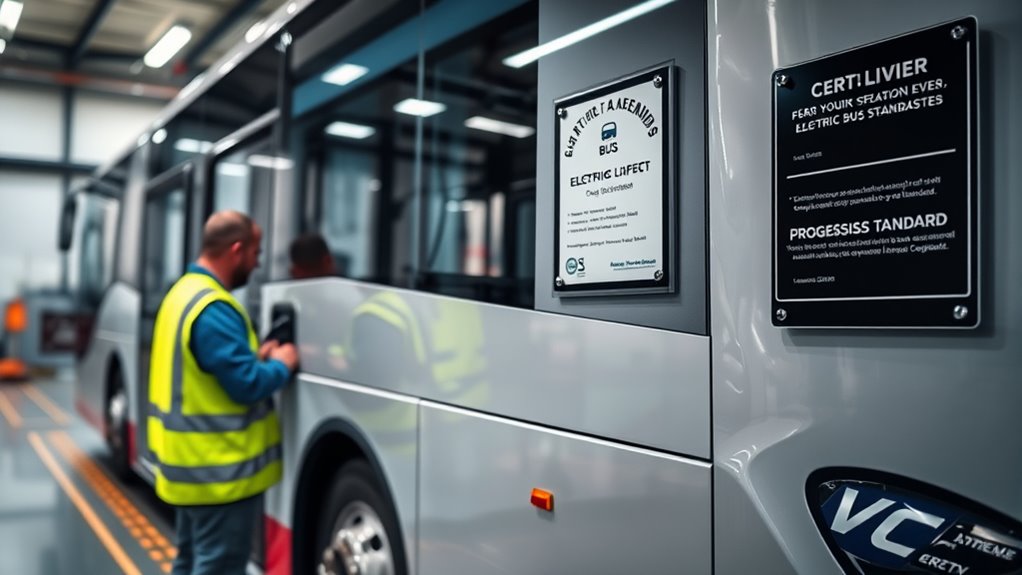
The foundation begins with Level 1 (HV1 Awareness), focusing on high-voltage safety awareness for all personnel, including basic vehicle orientation and OEM-specific training. This initial step ensures a solid understanding of safety fundamentals crucial for all staff working with electric vehicles. Moreover, ongoing monitoring of AI behavior and the development of robust safety measures are vital to adapt to emerging safety challenges.
Next, Level 2 (HV2 Specialized) deepens understanding of electrical systems, emphasizing safety procedures like lockout/tagout, and technical skills for technicians working with live systems. Incorporating insights from industry standards helps tailor training programs to meet evolving safety requirements.
The most advanced, Level 3 (HV3 Advanced), targets experts capable of de-energizing high-voltage systems and performing complex, high-risk tasks. Achieving this level demonstrates a comprehensive mastery of safety protocols and technical expertise necessary for critical maintenance roles.
Each level ensures personnel develop the necessary knowledge and skills systematically, preparing them for increasingly complex and critical responsibilities related to electric bus safety and maintenance. Additionally, ongoing education and adherence to regulatory standards are essential to maintain safety and compliance.
Ensuring Safety and Security in Electric Bus Operations
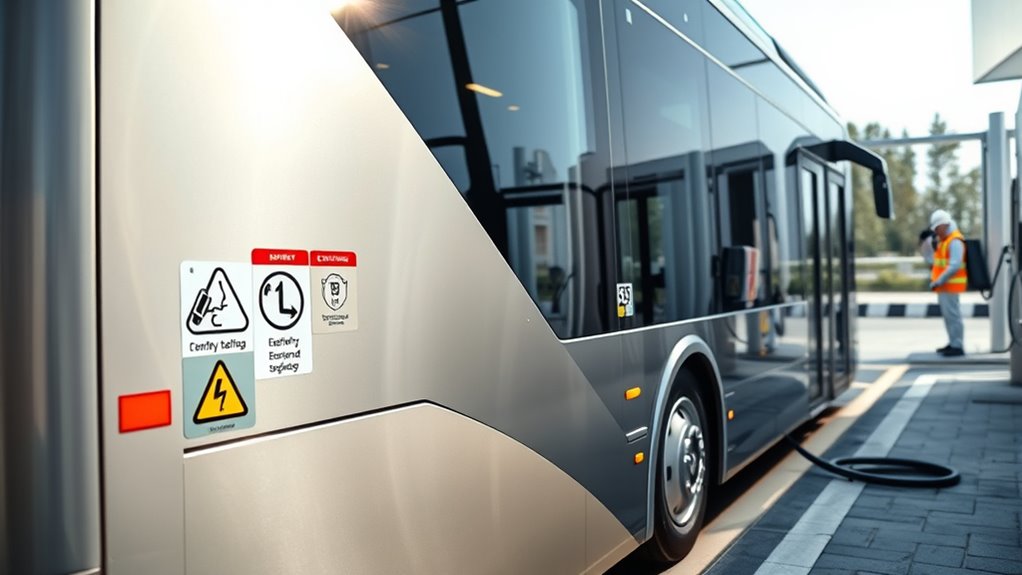
Are you ensuring that safety and security measures keep pace with electric bus operations? You must follow strict safety protocols, including emergency procedures and personnel training, to prevent accidents. Implementing standardized safety protocols ensures consistent safety practices across all operations. Battery safety is crucial, so compliance with standards like SAE J2929 and ISO 26262 is essential. High-quality, tested batteries with UL and UN certifications minimize fire risks. Additionally, implementing battery safety standards helps reduce potential hazards associated with battery faults. Regular maintenance checks help identify faults early, maintaining fleet safety. Studies indicate that battery fault prevention significantly enhances the overall safety of electric bus fleets. You also need to implement facility security protocols, access controls, and surveillance to prevent unauthorized access. Protecting operational data with robust cybersecurity measures is essential, along with vehicle monitoring systems and emergency response plans. Adhering to international regulations and industry standards guarantees safety and builds trust, ensuring your electric bus operations remain secure and compliant. Studies show homes without security systems are 300% more likely to be burglarized, emphasizing the importance of security system effectiveness in safeguarding assets and passengers.
Familiarization and Hands-On Training for Battery Electric Buses
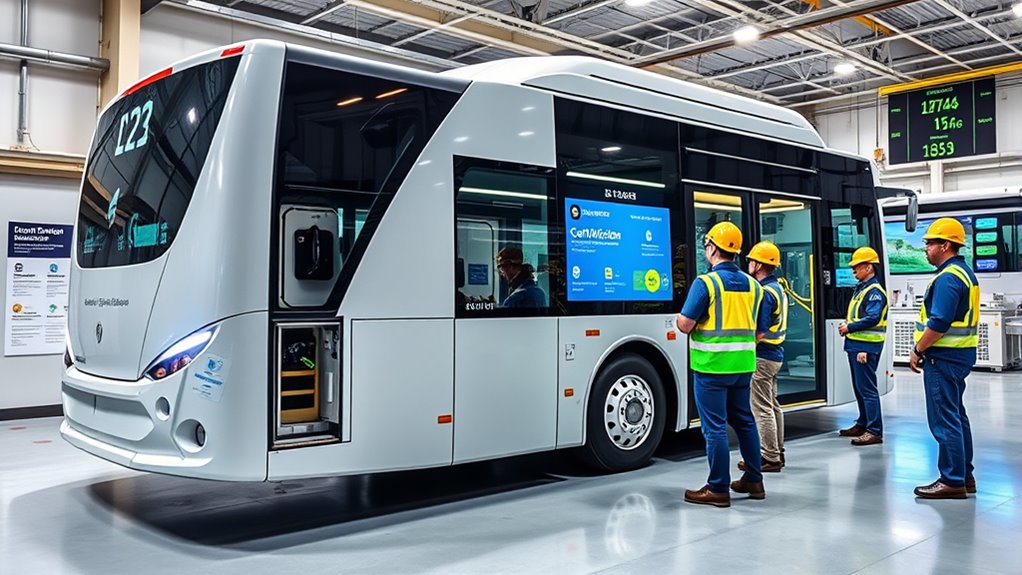
Familiarization and hands-on training play an essential role in preparing personnel to operate and maintain battery electric buses safely and effectively. This two-day curriculum covers BEB fundamentals, electrical safety, and charging technologies through three modules: BEB overview, electrical safety and PPE, and battery charging systems.
You’ll engage in live online sessions with manufacturer experts, participate in Q&A segments, and access recorded content with downloadable slides and notes. The training emphasizes understanding differences between BEBs and traditional buses, performing de-energization demonstrations, and following safety protocols for high-voltage systems. Additionally, a comprehensive understanding of self-watering plant pots can aid in maintaining the plants used during training sessions, ensuring they remain healthy and vibrant. This knowledge about Grocery Savings Strategies can also be beneficial in managing operational budgets for bus fleets.
You’ll learn about battery management, cooling, diagnostics, and vehicle-to-grid technology. This hybrid approach combines in-person and virtual lessons, ensuring you gain practical skills, troubleshoot effectively, and stay current with emerging maintenance practices and industry standards. Developing a thorough understanding of problem-solving skills is crucial for adapting to evolving industry challenges and ensuring safety. Additionally, understanding battery safety protocols and proper handling procedures is vital to prevent accidents and ensure operational reliability.
Industry Guidelines and Regulatory Frameworks
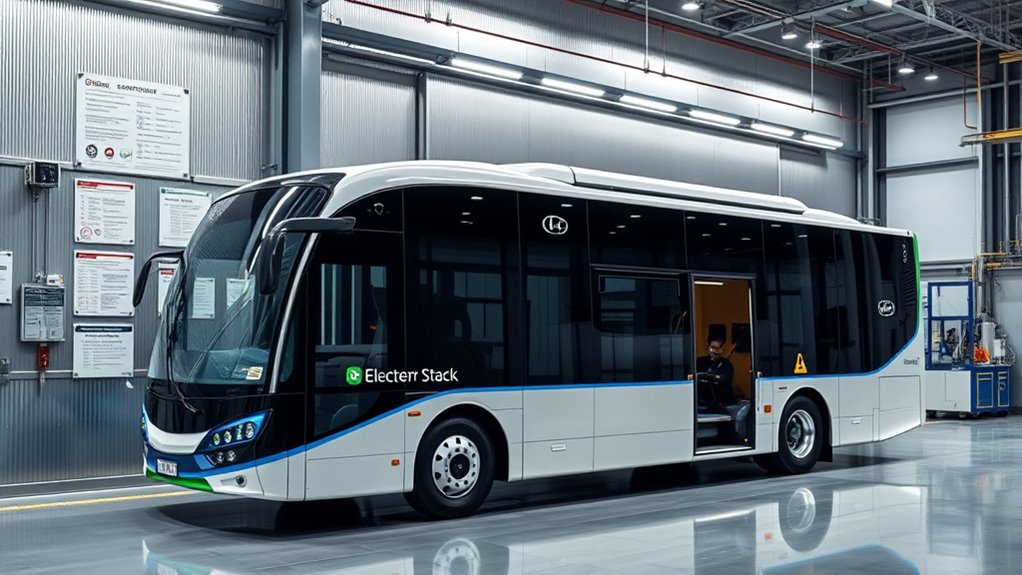
Understanding industry guidelines and regulatory frameworks is essential for ensuring the safe and effective deployment of electric buses. These standards, like SAE J2910 and SAE J2344, specify the requirements for electric propulsion systems, focusing on all-electric operation without range extenders. The American Public Transportation Association offers complementary guidelines that support proper deployment practices. Structural integrity must be maintained to ensure safety over the bus’s lifespan, and high-voltage components need clear labeling for maintenance and emergencies. Regulatory bodies such as the Federal Transit Administration set operational and safety requirements, including charging strategies and safety certifications. Compliance with these frameworks guarantees uniformity, safety, and sustainability. Additionally, standardization efforts are crucial for fostering interoperability and advancing technological innovation in the industry. Adhering to financial aspects such as proper documentation and certification processes is crucial for regulatory approval and long-term success. These guidelines help transit agencies navigate the complex landscape of electric bus deployment while aligning with environmental and safety regulations.
Key Safety Topics in Electric Bus Standards
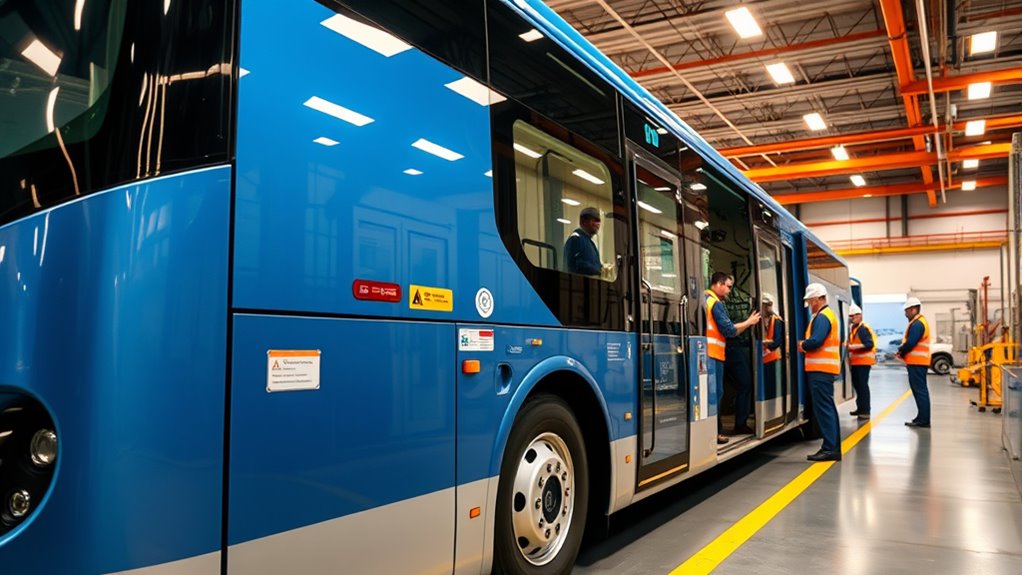
Safety is a top priority when deploying electric buses, and adhering to key safety standards helps guarantee these vehicles operate reliably and securely. Battery safety standards like SAE J2929 and ISO 26262 set strict requirements for design, manufacturing, and testing.
Prioritizing safety ensures reliable, secure electric bus operations through strict standards and rigorous testing.
Lithium-ion batteries must have UL and UN certifications, ensuring compliance with international safety norms. Protective casings made of steel or aluminum shield batteries from mechanical damage and fires. Structural integrity is also emphasized in safety standards to prevent battery damage during impacts. Incorporating quality control processes during manufacturing enhances overall safety and consistency across production batches.
Automatic electrical disconnects activate during severe crashes or faults, reducing risks. Extensive testing validates battery safety and durability. Regular testing under various conditions ensures the batteries maintain safety and performance over their lifespan. Safety features such as crash-ready systems, fire prevention measures, and advanced battery monitoring further reduce hazards. battery management systems are crucial for monitoring voltage, temperature, and current to prevent overheating and other issues.
Additionally, strict quality control during manufacturing and ongoing regulatory compliance ensure that safety standards are consistently met throughout the product lifecycle.
Benefits of Standardized Certification Programs
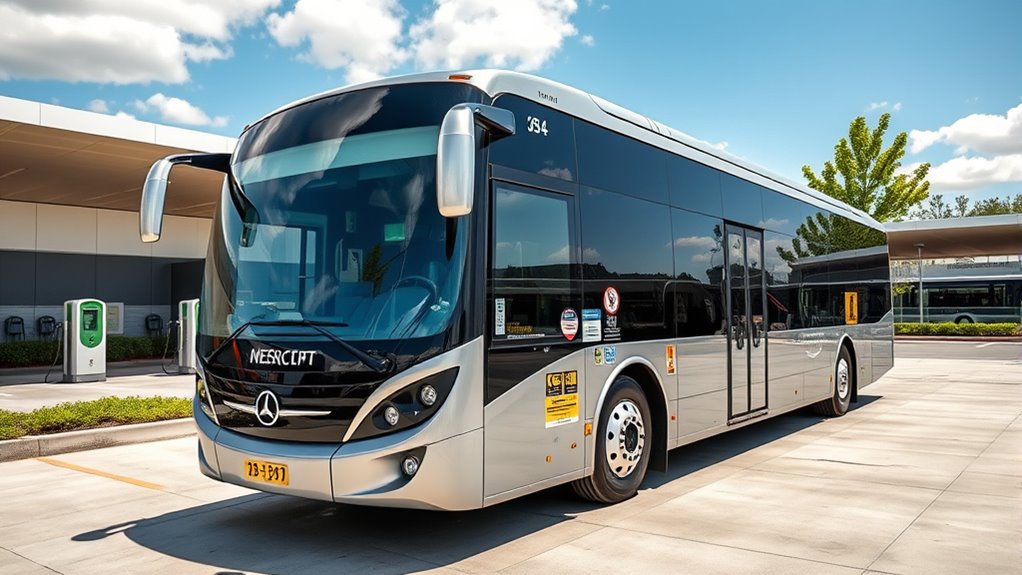
Standardized certification programs play a crucial role in ensuring that electric buses meet consistent quality, safety, and environmental standards across the industry. These programs help you achieve lower greenhouse gas emissions, improving air quality and supporting sustainability goals. Wall organization systems can be integrated into electric bus infrastructure to enhance safety and efficiency. By complying with certified standards, you can access government and utility incentives, reducing upfront costs and supporting long-term savings. They also promote operational efficiency through standardized maintenance and training, ensuring your fleet runs smoothly and quietly. Additionally, these certifications foster environmental awareness and community engagement, offering educational opportunities and green skill development. They ensure your buses meet regulatory requirements, simplifying compliance.
Frequently Asked Questions
How Often Should Electric Bus Safety Certifications Be Renewed?
You’re wondering how often you should renew your electric bus safety certifications. Based on best practices and regulations, you should conduct annual safety reviews, especially after incidents or major modifications.
Additionally, staff handling high-voltage systems need recertification every 2-3 years. Keep in mind that cybersecurity certifications are renewed quarterly.
Regular facility audits are also important to guarantee compliance with fire and electrical codes. Staying proactive helps maintain safety and compliance.
Are There Specific Certifications for Emergency Responders Working With Electric Buses?
Did you know that over 80% of emergency responders find specialized training essential for handling electric vehicle incidents?
Your question about specific certifications for electric bus emergencies is important. You should pursue recognized programs like NFPA’s online courses, which focus on electrical hazards and incident management.
These certifications boost your safety skills, guarantee you’re prepared for unique risks, and help you respond effectively to electric bus emergencies.
What Are the Costs Associated With Implementing Certification Programs?
You want to know the costs of implementing certification programs. These costs vary widely, from free options like basic driver and technician training to extensive programs costing up to $1,750.
Additional expenses include high-voltage training, which can reach $6,000. Remember, funding incentives and grants can greatly reduce these costs.
Planning ahead helps guarantee you stay within budget while meeting safety and industry standards effectively.
How Do Certifications Vary Between Different Transit Agencies or Regions?
You notice that certifications differ between regions and transit agencies due to local environmental rules, infrastructure, and policies.
Some areas require extra safety or environmental checks, while others focus on cost and resource availability.
These variations impact how agencies implement safety measures, train staff, and upgrade facilities.
What Ongoing Training Is Recommended for Keeping Staff Updated on New Technologies?
Imagine your team gathered around a digital dashboard, learning about the latest charging innovations. To stay current, you should participate in webinars on emerging tech, attend manufacturer-led workshops, and engage in simulator-based training.
Collaborate with community colleges for updated courses, and regularly review safety protocols. These ongoing efforts guarantee your staff remains sharp, confident, and ready to handle new technologies safely and efficiently as they evolve in the field.
Conclusion
By following established standards and certifications, you guarantee safe, reliable electric bus operations. Some might think certification is unnecessary or time-consuming, but it actually boosts your confidence and safety. Embracing these standards prepares you for future advancements and keeps you compliant with regulations. Investing in proper training isn’t just about meeting requirements—it’s about protecting yourself, passengers, and the environment. Stay certified, stay safe, and drive the future of transportation confidently.
